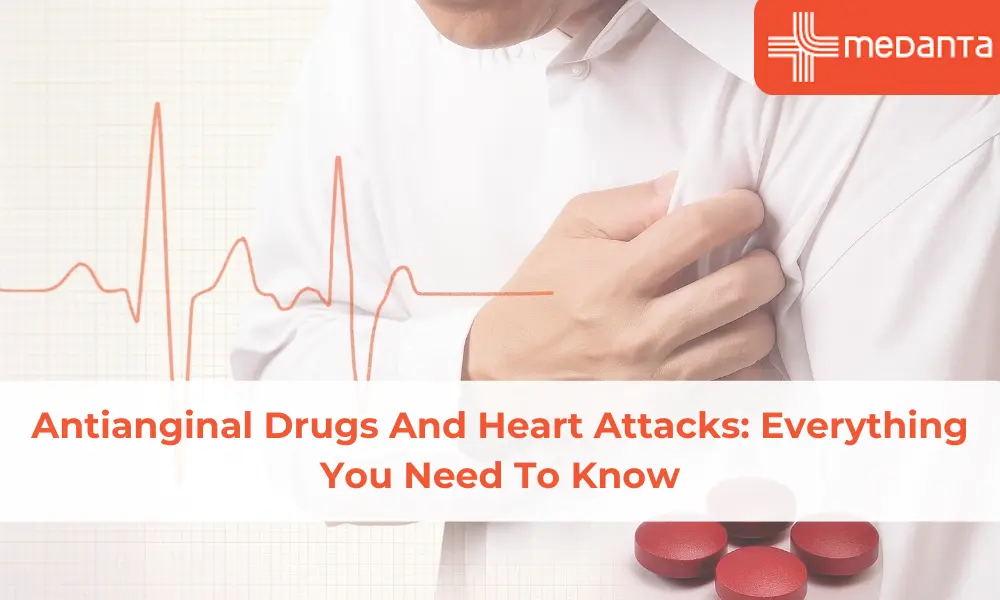Antianginal Drugs And Heart Attacks: Everything You Need To Know

TABLE OF CONTENTS
What is angina and what are the types of angina?
If you experience discomfort every time you cross a threshold of activity, emotional stress, or exercise, it is known as stable angina. In some cases, angina appears all of a sudden at rest or in the early mornings and this is known as unstable angina.
Stable angina is usually caused due by the reduction of the size of the lumen of the blood vessels, Unstable angina is caused due to a narrow area of the vessel getting temporarily blocked due to contraction of an artery or a clot.
Unstable angina is more unpredictable and dangerous and requires immediate medical attention.
However, both types of angina point to a weakness in the circulation of the heart and the pain is a symptom of some of the heart muscles not getting enough oxygen.
What is anti-anginal medication?
When you visit the doctor with angina, they will recommend a series of tests to determine the exact state of your cardiovascular health like exercise tolerance tests on a treadmill or other tests to see the electrical activity of the heart through ECGs of the blood flow in the heart through advanced imaging studies.
Your doctor may also recommend angioplasty for unstable angina to look for and clear any blockages that may be there. This procedure may also be combined with inserting stents that keep the vessel dilated and allow blood to flow. This is a treatment for the condition, but the chances of developing the condition again remain high because usually, it's not just one area that develops a problem at a time.
Either after treatment or to prevent the occurrence of complications, your doctor may recommend a series of medications that help to reduce the risk of cardiovascular events. This is known as anti-anginal medication. Anti-anginal medications work by improving blood circulation in the heart, reducing the contraction of blood vessels and blood pressure against which the heart has to pump blood, or preventing or reducing the formation of clots in the bloodstream.
What are the types of anti-anginal medications?
Most of the anti-anginal medications given to you will fall under one of the following categories. You may find this out by reverse searching the name of the compound in the medicine on an online search platform.
Medicines Usually Prescribed for Stable Angina
1. Nitrates
Nitrates help expand arteries and veins, improving blood flow by increasing the lumen size. They can be recommended at specific times of the day based on your angina pattern.
a. Sublingual Nitroglycerin
Used as an SOS solution for sudden angina or preventively during activities that trigger angina.
Placed under the tongue in a moist area.
Onset: 2–5 minutes
Duration: 15–20 minutes
Quick-acting solution for immediate relief.
b. Oral Nitrates
Isosorbide dinitrate (ISDN):
Given 2–3 times a day
Onset: 15–30 minutes
Duration: 3–6 hours
Schedule may be adjusted to prevent tolerance.
Isosorbide-5-mononitrate (ISMN):
Onset: 30 minutes
Duration: 6–8 hours
Extended-release forms available once daily.
Important to follow exact dosage and schedule.
c. Transdermal Nitroglycerin
Continuous delivery via a patch.
Can develop tolerance; must follow doctor’s instructions exactly.
2. Adrenergic Blockers (Beta-Blockers)
Beta-blockers block sympathetic nervous system signals, reducing heart rate, blood pressure, and heart contraction force.
This lowers the heart’s workload and oxygen demand, improving survival and reducing heart attack risk.
a. Types of Beta-Blockers
Non-selective: Affect the heart and other areas with beta receptors (e.g., propranolol).
Cardio-selective: Target heart-specific beta receptors at lower doses (e.g., atenolol, metoprolol).
Safer for patients with obstructive lung disease.
Important: Never stop beta-blockers suddenly. Abrupt withdrawal can worsen angina, trigger heart attacks, or be fatal. Always consult your doctor before makingchanges.
3. Calcium Channel Blockers
These medicines relax blood vessel walls, lower blood pressure, and reduce the heart’s oxygen demand.
Typically prescribed when nitrates and beta-blockers are ineffective or cause side effects.
a. Dihydropyridines
Examples: Amlodipine, Nifedipine
Work mainly by dilating blood vessels.
May cause flushing, edema, or lightheadedness.
b. Verapamil
Slows heart rate and reduces contraction force by affecting the heart’s electrical system.
Less effective than beta-blockers but suitable in certain cases.
c. Diltiazem
Mildly reduces heart rate and dilates blood vessels.
Less aggressive than other calcium channel blockers.
d. Ranolazine
Newer drug with a complex mechanism.
Often added alongside nitrates, beta-blockers, or calcium channel blockers for additional angina control.
4. Aspirin
Reduces blood clot formation in narrowed coronary arteries.
Helps prevent complete blockage in patients with stable angina.
Medications for other conditions:
Other conditions may need to be treated along with angina. These may include separate medications for the treatment of:
High blood pressure
High Cholesterol or Lipid abnormalities
Smoking
Excess weight
Anxiety and stress






